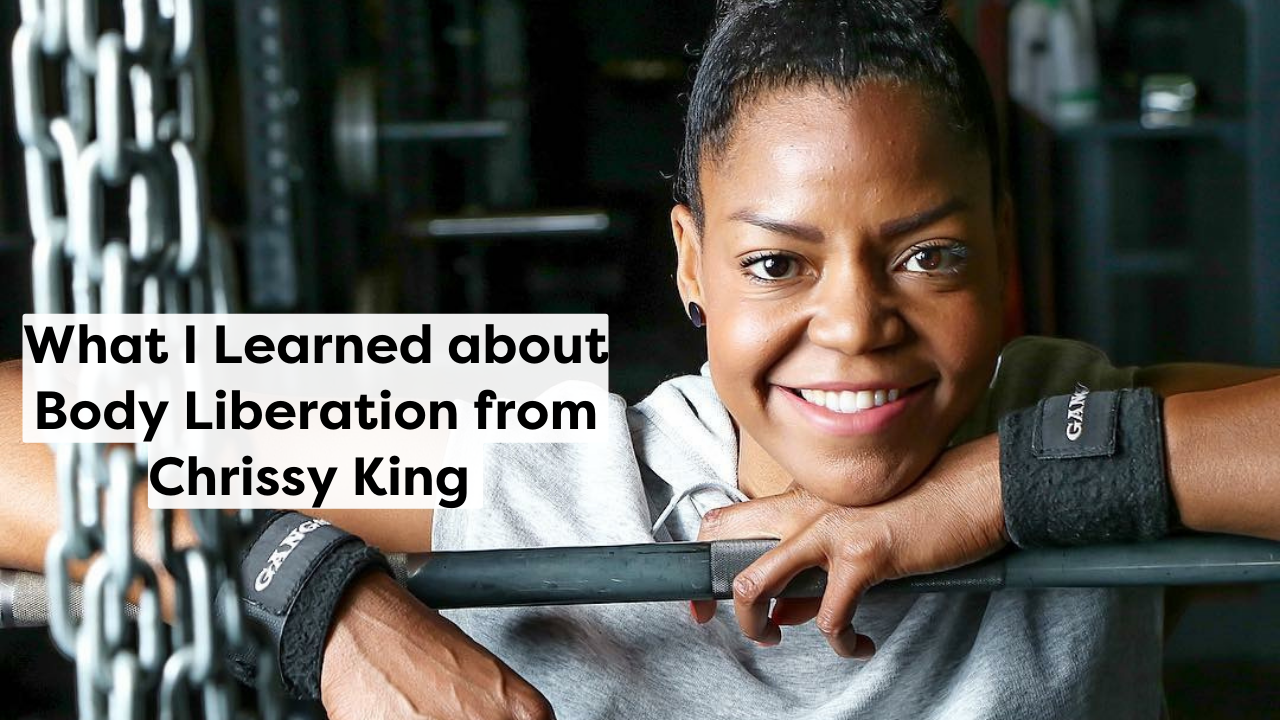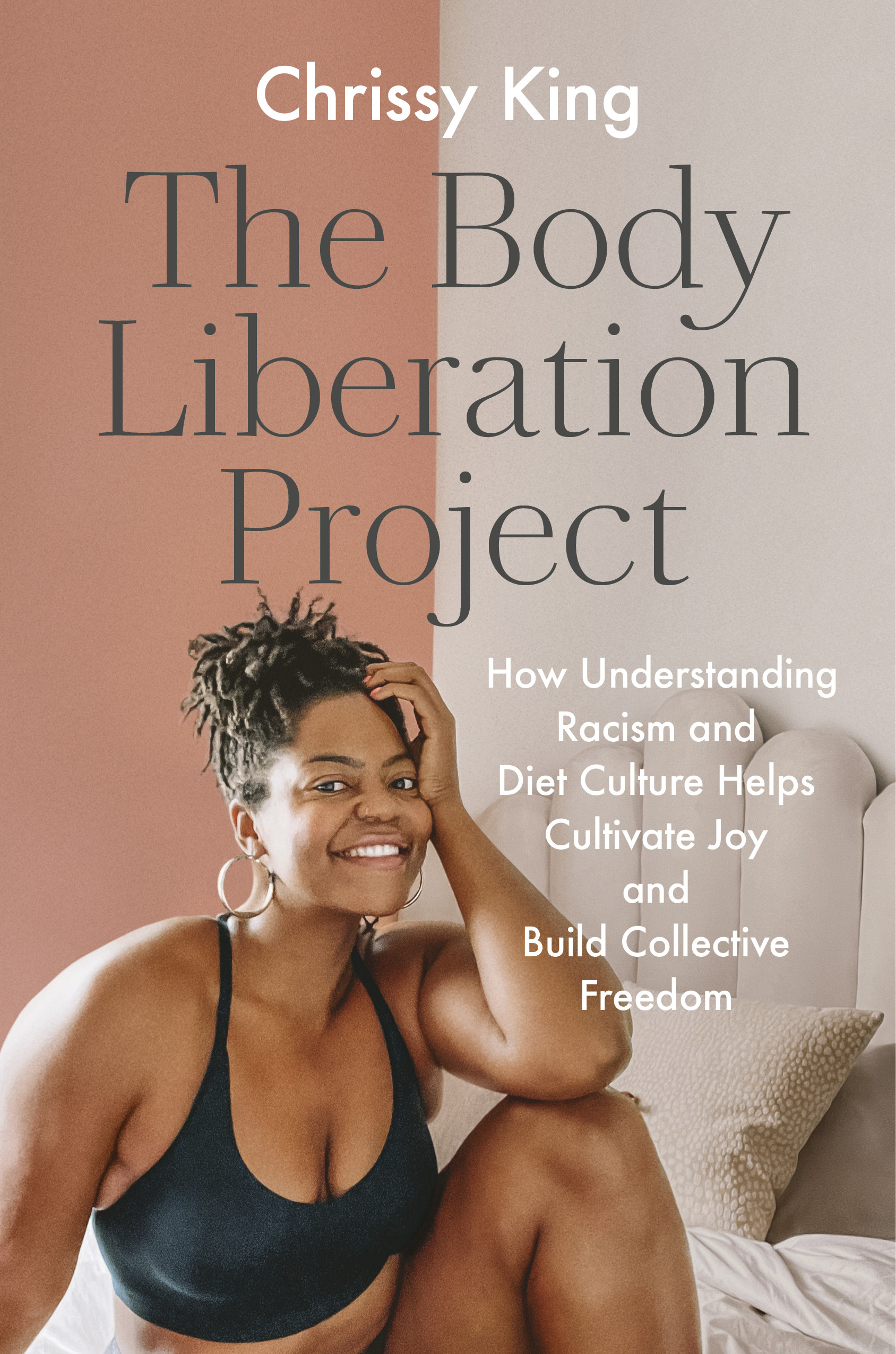What I Learned about Body Liberation from Chrissy King

A couple of years back, we invited Chrissy King for a conversation with our cohort of Ski Babes. Chrissy is a fitness trainer, author, and thought leader, and she had so many amazing insights to share.
Chrissy’s work centers around body liberation: she literally wrote the book on it.
This summer, we’re having Chrissy back to lead us in a book club on her new book! Summer Strong members will get the chance to read the book and share reflections in community, and then we’ll have Chrissy join us for a live session to debrief all we’ve learned.

If the term Body Liberation is new to you, body liberation means that we are inherently worthy because we exist. It seeks to liberate us from the time, energy, and harm that comes from trying to “fix” our bodies, when in fact we are not broken at all. It recognizes that our bodies aren’t the entirety of who we are, but our bodies are what enable us to have this human experience.
Body liberation sets us free from the systems of oppression that deem certain bodies as more or less valuable than others. This way, we can all live in peace and wholeness with ourselves. When we stop obsessing about our bodies and stop wishing our bodies were something else, we can have more full human experiences.
Here are three things I learned from Chrissy King about her work on body liberation.
Learning #1: Taking Up and Sharing Space is a Body Liberation Practice
Diet culture tells us that literally shrinking ourselves makes us more valuable. This is a huge lie. We deserve to take up space just as we are.
The concept of taking up space applies in really practical ways in our time outdoors. Those of us with identities that aren’t well-represented in outdoor spaces may implicitly feel like we have less of a right to outdoor spaces, but this just isn’t true.
For example, practice following established right-of-way etiquette on trails, which sometimes means taking up space rather than stepping aside automatically. Instead of apologizing when you are passing others on the trail, try seeing how it feels to say “thank you” instead.
As we learn to take up our own space, it’s important to also remember to support others taking up space, too. The term sharing space means knowing when to pause, step back, speak less, and make room for others to have the spotlight. Your story matters, but sometimes it’s valuable to intentionally prioritize the stories of those whose identity might not have been heard.
Each of our individual identities and stories are a tapestry: in some areas we experience oppression, and in others we have privilege. It’s important to be able to recognize which is which within your own story. There might be some situations where your perspective isn’t represented, and that might be a good time to really show up with your story. Other times, your perspective might be well-represented, and it might be better to let others speak and share their experiences.
An important nuance with sharing space is to remember that people don’t owe you their experiences and stories. Let other folks share only if they want to. There are a million reasons someone may not want to talk about their experience in a particular moment, and it can be harmful to pressure someone to share when they’re not interested in doing so. Be mindful of balancing creating opportunities for folks to share without making them feel obligated to do so.
Learning #2: Body Politics and Fatphobia are Rooted in Racism
So many of the ways society polices our bodies–transphobia, fat phobia, reproductive rights, just to name a few–are rooted in white supremacy. Fat phobia in particular has strong ties to racism, especially against Black people. Chrissy recommends Sabrina Strings’ book “Fearing the Black Body” for a deep dive on the connection between fatphobia and anti-Blackness.
With that in mind, body liberation and dismantling the systems of oppression are the same thing. Both are a way of actively creating a world in which all of us can live at peace within ourselves.
Learning #3: Rest is a Key Piece of Body Liberation
In our Mind & Mountain programs, we talk a lot about the importance of rest in the context of exercise. Rest gives our bodies the opportunity to rebuild and heal. We’ve also talked about rest in terms of the seasonality of life. Rest is a necessity!
Body liberation adds another facet to rest. Rest includes prioritizing our own joy and finding what works for us to feel centered. Recognizing that our bodies deserve rest instead of constant hustling, punishment, and pressure is a radical act of self-love and freedom.
Chrissy recommends following The Nap Ministry as a resource for exploring the topic of rest as not just a way to take care of ourselves, but as a form of resistance, too.
Learn More from Chrissy King
We are so excited to invite Chrissy back this May! Join us for our Summer Strong book club on The Body Liberation Project & live event with Chrissy to talk about all things body liberation and how you can integrate these ideas into your own life.
In the meantime, here’s how you can learn more about Chrissy’s work:
- Visit her website to learn more about her work, products, and services. Sign up for her emails to follow along while you’re there!
- Buy and read her new book: The Body Liberation Project
- Follow her on Instagram: @iamchrissyking
Watch her webinar on Anti-Racism for Wellness Professionals (lots of goodness here for folks in a variety of careers and community leadership roles!)
